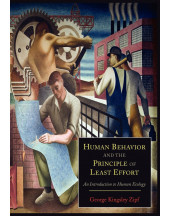Human Behavior and the Principle of Least Effort: An Introduction to Human Ecology
Individual order




 0
0 reviews
0
0 reviews
540.00 uah
ISBN:
9781614273127
Availability:
Author
George Kingsley Zipf
Format
Paperback
Number of pages
588
Publisher
Martino Fine Books
Size
17 x 3 x 24.4
Year of publication
2012
Weight
0.25kg
- About the book
- Reviews (0)
About the book Human Behavior and the Principle of Least Effort: An Introduction to Human Ecology
Людська поведінка та принцип найменшого спротиву: Вступ до екології людини | Перевидання версії 1949 року. Точне факсиміле оригінального видання, не відтворене за допомогою програмного забезпечення для оптичного розпізнавання. Принцип найменшого спротиву - обширна теорія, яка охоплює різні сфери: від еволюційної біології до дизайну веб-сторінок. Вона теоретично допускає, що тварини, люди та навіть техніка зазвичай обирають шлях найменшого спротиву або "зусиль". Це, певно, найвідоміше припущення або, принаймні, задокументована дослідниками у сфері бібліотекознавства та інформаційної науки. Їх принцип проголошує, що клієнт, який шукає інформацію, як правило, використовує найзручніший та найменш затратний метод пошуку із доступних. Пошуковий механізм зупиняє роботу після того, як знаходить результати, які хоча б мінімально задовольняють запит. Ця теорія відповідає дійсності незалежно від рівня володіння пошуковими технологіями або знаннями у предметній галузі. Принцип найменших зусиль аналогічний принципу найменшого спротиву. Він був досліджений лінгвістом Джорджем Кінгслі Ціпфом, автором класичного трактування. Ціпф висунув теорію, що розповсюдження слова обумовлене частотою його ефективного використання у процесі комунікації. Наразі ця теорія відома як Закон Ціпфа.Human Behavior and the Principle of Least Effort: An Introduction to Human Ecology | 2012 Reprint of 1949 Edition. Exact facsimile of the original edition, not reproduced with Optical Recognition Software. The principle of least effort is a broad theory that covers diverse fields from evolutionary biology to webpage design. It postulates that animals, people, even well designed machines will naturally choose the path of least resistance or "effort". This is perhaps best known or at least documented among researchers in the field of library and information science. Their principle states that an information seeking client will tend to use the most convenient search method, in the least exacting mode available. Information seeking behavior stops as soon as minimally acceptable results are found. This theory holds true regardless of the user's proficiency as a searcher, or their level of subject expertise. The principle of least effort is analogous to the path of least resistance. The principle was studied by linguist George Kingsley Zipf, author of this classic treatment of the subject. He theorized that the distribution of word use was due to the tendency to communicate efficiently with least effort and this theory is known as Zipf's Law.
Other books by the author
George Kingsley Zipf
George Kingsley Zipf
Book reviews Human Behavior and the Principle of Least Effort: An Introduction to Human Ecology (0 reviews)
+ Добавить отзывPreviously reviewed
One click buy


 +38 050 462 21 01
+38 050 462 21 01

































